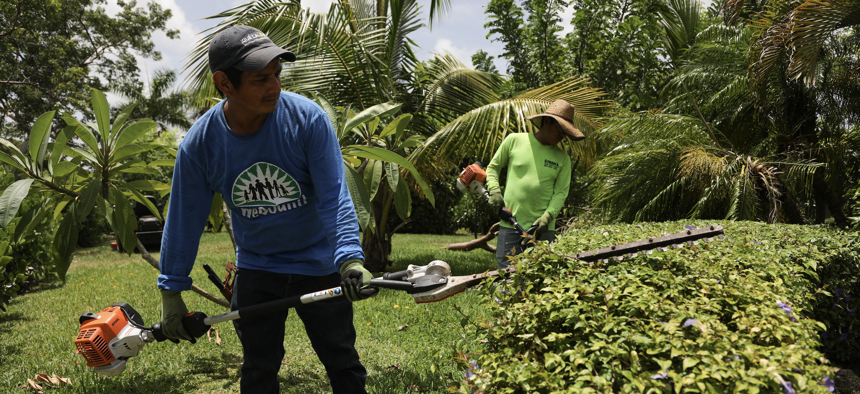New index ranks Florida 29th among states for workers
Researchers looked at over two dozen types of policies in all 50 states as part of their analysis.

Homestead, Florida landscaper Carlos Morales (foreground), seen at work on Aug. 1. Florida is ranked 29th among the states in working conditions, according to a new report. Cindy Karp/for The Washington Post via Getty Images
When it comes to proactively protecting and supporting workers, Oregon is the state with the best policies in place, while North Carolina ranks worst, according to a new report.
Florida comes in at No. 29.
Oxfam America — a nonprofit focused on ending poverty — ranked the best and worst states to work based on three policy areas: wages, worker protections and rights to organize. The report looks at all 50 states, as well as Washington, D.C. and Puerto Rico.
The 10 best states for workers, according to the report, include:
- Oregon
- California
- Washington
- Washington, D.C.
- New York
- Massachusetts
- Connecticut
- New Jersey
- Colorado
- Illinois
Oregon, California and Washington are the only states with laws that protect outdoor workers from extreme heat. Oxfam America has been issuing its “Best States to Work Index” annually since 2018, but this year’s analysis is the first to include data about what states are doing to protect workers from extreme heat.
The 10 worst states for workers, according to Oxfam, (listed from worst to better) include:
- North Carolina
- Mississippi
- Georgia
- Alabama
- Texas
- South Carolina
- Kansas
- Oklahoma
- Utah
- Idaho
All of the bottom-ranking states have a minimum wage of the federally mandated $7.25 per hour and “right to work” laws that weaken labor unions. None of these states provide paid sick or family leave.
Florida ranks 29th overall; 30th for wage policies, 37th for worker protection policies, and 26th for rights to organize.
Among the black marks against the Sunshine State, the index says, are that "localities in Florida can not set the minimum wage above the state standard," the state "does not provide some form of paid family leave" and "does not provide a heat safety standard for outdoor workers."
Florida was noted, however, for providing "collective bargaining and wage negotiations to teachers," requiring "collective bargaining for public workers" and offering "some form of sexual harassment protection in state law."
The analysis is intended to offer a blueprint for how states can better support their workers, as well as highlight policies that are working well, the report said.
“There is no state with a perfect score; even those states at the very top of our ranking have room for improvement,” it said.
To see each state’s “scorecard,” click here. The report is based on policies that were in place as of July 1, and researchers tracked 26 policies for the analysis. To read the full report, click here.
Molly Bolan is the assistant editor for Route Fifty, where this story was first published.
NEXT STORY: Florida elected official still serves although she lives in Georgia
